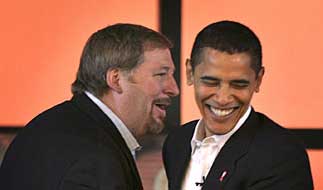“I can’t think of a surer way to lose both our national soul and the struggle against terrorism. Yes, Mr. Gingrich and Ms. Palin, there’s a cultural-political offensive afoot to undermine our civilization. And you’re leading it.” Slate‘s William Saletan reviews the current GOP jihad against a potential mosque near Ground Zero (not to be confused with the mosque that’s already been there for 40 years.) But, on the bright side, at least now we know not to take the ADL seriously anymore. (See, by way of contrast, J-Street’s statement.)
Category: Religion
They Kick Ass for the Lord!
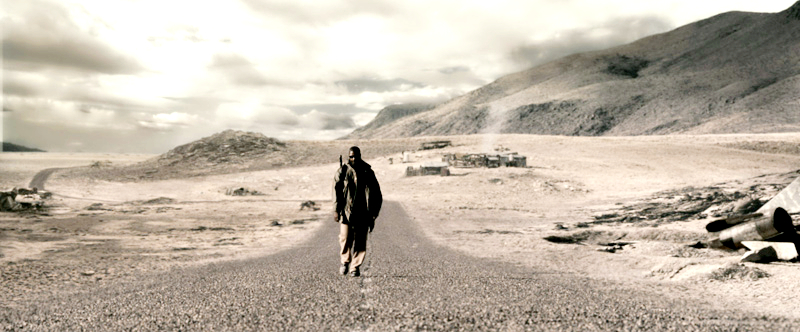
In any event, I saw Allen and Albert Hughes’ The Book of Eli and Scott Stewart’s Legion on subsequent weekends (with another vaguely religious-themed movie in between, which I’ll get to in a bit), and they seem like they merit discussing together. Both are post-apocalyptic B-movies, and, weirdly enough, that’s B as in Bible: Both use Judeo-Christian themes as a pretext for ninety minutes or so of Matrix-y ass-kicking. And neither are as smart, entertaining or satisfying in their B-movieness as the Spierig’s recent Daybreakers. Of the two, Legion probably comes closer to finding that popcorn movie groove, just because it makes no bones about being unabashedly dumb — but it too slips off the rails in the final half-hour.
More on that in a bit. Let’s take the Hughes’ Book of Eli first. I should start by saying that I’m glad to see the Hughes brothers making a movie again, although I wish it was one a good deal better than this goofy drek. Their assured, eminently quotable 1993 debut Menace II Society is one of my favorite films of the nineties, and in a perfect world it should have gotten all the many props that went to John Singleton’s more Hollywood’y Boyz n the Hood of 1991. (“Now O-Dog was America’s worst nightmare: Young, black, and don’t give a f**k.“) And their take on From Hell in 2001 was laudably strange and decently compelling — It’s definitely not the worst Alan Moore adaptation out there, by a long shot.
To their credit, the Hughes give this post-apocalyptic America a bleached-out, Big Sky look that’s eye-catching…for the first half-hour of so. (After awhile, there get to be way too many slo-mo hero shots of Denzel and his eventual protege, Mila Kunis.) And, during that opening half-hour, it seems like Book of Eli might make for a pretty solid spaghetti western or samurai flick. There are two kinetic six-or-seven-on-one melees in particular, wherein a motley assortment of Borderlands-style goons and Mad Max castoffs meet the business end of Denzel’s machete, that suggest The Book of Eli will make for a pretty fun B-movie ride.
But then it all starts falling apart, mainly as a result of terrible writing. For it soon becomes clear that Denzel, a.k.a. Eli, is attracting attention in this World Gone Wrong because he is carrying — I kid you not — the Last King James Bible on Earth. Yes, somehow — only thirty years after the nukes fell — every single bible out of every single house, apartment, bookstore, mega-mart, and motel room on the planet has been destroyed…but one. This is apparently, it is said, because the survivors blamed the Bible for the End Times coming and destroyed them all. How the few remaining survivors managed to relay this message all around the world after communications had stopped is left unexplained. Nor do they show the poor irradiated schmoes who were forced to wander from burnt-out church to broken-down motel over those thirty years, scouring the Earth for the estimated 7.5 billion copies of the world’s most reproduced book. And they only missed one!
But that’s not all. So, Denzel is toting around that last Good Book, and the Big Bad of the local Bartertown — Gary Oldman — wants its immense persuasive power for his own. I forget the exact wording, but he does some monologuing to the effect of: Only with that bible in my possession will I have the words to exert my domination over the remnants of humankind! So, in other words, if he gets the Book under his thrall, Oldman will be the new prophet-king of social control. To which I say…huh? First off, at the risk of offending certain readers’ religious sensibilities — move along, Tom Cruise — hasn’t Oldman’s character ever heard of L. Ron Hubbard or Dianetics? (Or seen Zardoz, for that matter?) If you want to set up a new religion with yourself at its center, you don’t really need a KJV bible to do it. Second, it’s made abundantly clear that Oldman knows the bible pretty well from his early days anyway. He can’t just…wing it? How much more would you need other than the stories, which everybody knows, and a few choice excerpts like the Lord’s Prayer?
Not to give the game away, but The Book of Eli also suffers from a truly dumb Shyamalan ending which I will not disclose here. (Suffice to say, A Clockwork Orange notwithstanding, Malcolm McDowell showing up in the late going of any film isn’t usually a mark of quality. And if you really want to know the final turn, I’ll give a hint in spoiler-vision: “What do Rutger Hauer and Zhang Ziyi have in common?“) Now, to be fair to The Book of Eli (and as an AICN commenter pointed out), a lot of sci-fi and fantasy B-movies have plot devices that make it hard to sustain disbelief — time-traveling robots from the future, for example. True, Eli‘s central conceit is roughly similar to the plot of the very good A Canticle for Leibowitz (although that book takes place centuries after the nuclear holocaust, and the Catholic priests involved aren’t trying to preserve the Bible per se.) And, even the next movie I’m about to discuss makes less sense up front than Book of Eli‘s goofy “all the Bibles are gone!” schtick.
The difference is, in those other movies (Legion aside), once you accept the premise that robots can time-travel, Earth is now populated by damn dirty apes, vampires have taken over or whathaveyou, the rest of the story makes decent sense in that world, and is pretty darned entertaining to boot. The Book of Eli…not so much. For one, Denzel’s character is too superhuman throughout — After the first few fracases, there’s no sense at all that he ever might be in danger. More problematically, perhaps realizing that fundamental problem, the screenwriter (Gary Whitta) instead decides to punctuate pretty much every scene with women in sexual peril, a decision which is supremely lazy and, after awhile, borderline misogynistic. (Were you to play a drinking game involving one beverage for every time Mila Kunis, Jennifer Beals, or any other woman in The Book of Eli is threatened with rape or violence, or those threats are acted upon, you may just end up drunk enough to stop wondering what the hell is wrong with Gary Whitta.)
Anyway, all that aside, there are a few small glimmers of entertainment here and there in the later going, although they’re mostly meta moments: Michael Gambon and Frances De La Tour escape Hogwarts long enough to show up as gun-totin’ redneck cannibals, and both play it like they’re on some kind of dare. And Dracula does get to share another scene with his Renfeld, the inimitable Tom Waits. (Oldman and Washington are professionals anyway — neither condescend to this lousy material.) In the end, though, The Book of Eli is a bad movie with a dumb premise that doesn’t even seem to understand how bad or dumb it is. And that ultimately just makes it worse.
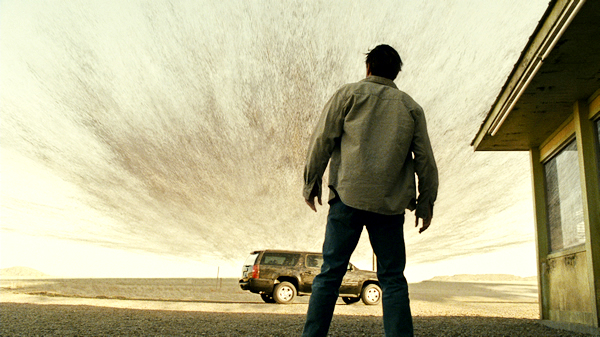
Now Scott Stewart’s Legion, on the other hand, wears its B-movie badness like a badge of honor, and that gets some points from me. I mean, Dennis Quaid and Charles Dutton as two short-order cooks, fending off demons in their middle-of-nowhere diner (in a place called Paradise Falls, no less)? These guys are hardened veterans of this sort of thing. They know the score, and they help bring the right sense of proportion to the rest of the survivors, including Adrianne Palicki, Tyrese, Kate Walsh, Willa Holland, and the underrated Lucas Black (who, on Sling Blade alone, really should’ve played Jake Lloyd’s part in The Phantom Menace.) In every scene they’re in, Quaid and Dutton manage to wordlessly convey their understanding that: Look at best, we’re making Tremors here, people.
In Legion, the End of Days wasn’t a man-made screw-up this time. Rather, in a fit of Old Testament wrath, our Father who art in Heaven decides that the whole mankind experiment has totally and utterly failed (maybe He caught wind of the whole reality-TV thing) and thus sends down a few plagues — locusts, angels, and whatnot — to smote us all into oblivion. Fortunately for us, the archangel Michael (Paul Bettany) isn’t down with the new program, and so he clips his wings, dons some choice duds and a ridiculous amount of firepower, and becomes humankind’s protector, or at least the protector of an unborn child that apparently will be some kind of second Messiah. (Think John Connor, but biblical.) And if he can save a few diner patrons while he’s at it, well the more the merrier.
So, in other words, if The Book of Eli was a post-apocalyptic western — a Stranger comes to Town and all that — Legion is really more of a zombie movie. It’s a bunch of random strangers thrown together by crisis, trying to survive against impossible supernatural odds without killing each other. Or, in other words, it’s The Prophecy meets Night of the Living Dead meets The Terminator meets Assault on Precinct 13. (At times, it also feels a lot like the considerably better Prince of Darkness, but without Alice Cooper around to play the possessed folk.) And, even more than with Eli, I vibed into its flagrant b-movieness for the first hour or so of its run.
The problem is, Stewart and co-writer Peter Schink don’t really seem to know where they want to take this thing. You know that old saw about throwing a bunch of characters together in a room and pretty soon they start to write themselves? Well, if Legion is any indication, sometimes they don’t. And so the movie starts to lose its early head of B-movie steam by the middle going, as the various survivors pair off and spin their wheels with “character-building” conversations that go nowhere. There are a few funny exchanges, most of which made it into the ubiquitous trailer. (“I don’t even believe in God!” “That’s ok, He doesn’t believe in you either.“) But even more than in most of these flicks, I found myself sitting around waiting for the next attack just to get things moving once more.
And that brings us to the other big problem. The ground rules here don’t make a whole lot of sense. So these zombies are angels? Clearly, gunfire cuts through them like butter, so they don’t seem any different from, you know, zombies. And why are they attacking in waves like this? What’s the plan here? I know the Lord works in mysterious ways, but…is He really one for acid-drenched booby traps? Schink and Stewart have one clever conceit here — that the most innocuous-looking people around are the ones you’ll really need to worry about to go bugnuts evil at the drop of a hat. But they just keep reusing it. When an old lady attacks (again, as per the trailer), it’s a clever reversal of expectations. But when little kids and the ice cream man later do the same, it all gets a bit redundant.
By the time the archangel Gabriel (Kevin Durand, seeming, in all honesty, pretty straight-to-video) shows up in the last half-hour, Legion just gives up any pretense of coherence. I can barely explain anything that happens after the remaining few souls scramble out of the diner, other than to say it really isn’t worth trying to explain anyway. To its credit, Legion may not suffer from the dreary self-seriousness of The Book of Eli, but the last reel is just as convoluted and nonsensical. And, as such, both movies end up feeling a bit like the lurid daydreams of an ADD-afflicted teenager, one who’s fallen asleep after way too much Red Bull, Bible Study, and Modern Warfare 2. It’s time to wrap this up, so if you’ll forgive a really terrible pun: Lacking conviction and passionate intensity, sadly, neither of these flicks are worth a second coming.
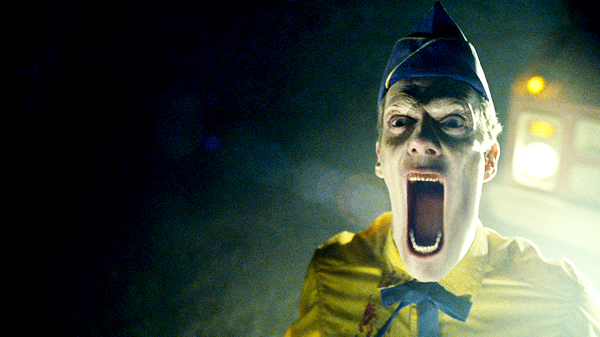
Frere Jacques, Dormez-Vous?
z'[W]ith Reagan, the prophecy appreciation part of his brain functioned quite independently of the part that started wars (there’s nothing in the Old Testament about Nicaragua or even Grenada). Bush seems to have taken the threat of Gog and Magog to Israel quite literally, and, if this story can be believed, to have launched a war to stop them.“
One rather frightening story from a few days ago: As if the recent “Onward Christian Soldiers” war reports in GQ weren’t Crusadery enough, it appears that Dubya explictly invoked the End of Days to convince Jacques Chirac to get involved in the Iraq War, making his appeal Christian-to-Christian about the unholy dangers of Gog & Magog. Uh, really? (Apparently, Chirac has confirmed it.)
Onward, Christian Soldiers.
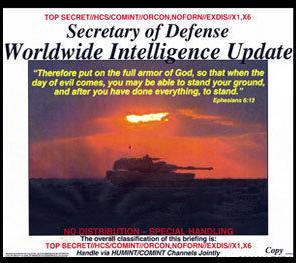
Also linked in Rich’s piece is a damning profile of Donald Rumsfeld’s tenure at Defense by GQ’s Robert Draper, which happens to include these bizarre and, diplomatically speaking, blatantly idiotic Christian-minded cover sheets created especially for Dubya’s briefings. “This mixing of Crusades-like messaging with war imagery, which until now has not been revealed, had become routine…At least one Muslim analyst in the building had been greatly offended; others privately worried that if these covers were leaked during a war conducted in an Islamic nation, the fallout–as one Pentagon staffer would later say — ‘would be as bad as Abu Ghraib.’ But the Pentagon’s top officials were apparently unconcerned about the effect such a disclosure might have on the conduct of the war or on Bush’s public standing…Rumsfeld likely saw the Scriptures as a way of making a personal connection with a president who frequently quoted the Bible.”
Dangerous Habits.
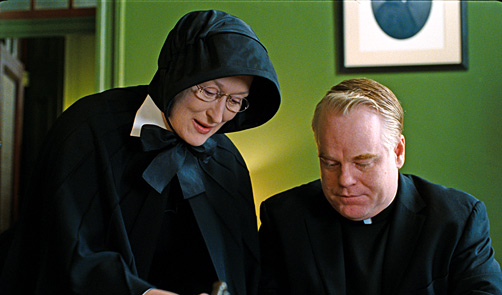
Now, I should probably say upfront that, unlike some critics who’ve responded very favorably to the film, I am neither a practicing Catholic nor aggressively ex-Catholic — my family worked all that out in generations prior — and thus I have no personal feelings and/or axes to grind with the church or the accompanying Catholic school experience. As an agnostic if I’m anything, I’d say I’m actually pretty comfortable living in doubt, so it wasn’t the movie’s purposeful lack of resolution that rankled me. As a filmgoer, tho’, I have to give an amen to Salon‘s Stephanie Zacharek, who basically nailed this film to the wall: “Nothing in ‘Doubt’…is certain, definitive or clear. Least of all the filmmaking.”
The year is 1964, Kennedy’s assassination still clouds the nation in gloom, and, in the Bronx working-class neighborhoods that comprise the parish of St. Nicholas (as in Colin Hanks’ parish a few boroughs over), the times-they-are-a-changin’. Representing this tolerant — some might say permissive — new era of Beatlemania and Vatican II is one Father Flynn (Philip Seymour Hoffman, good as always but let down by the material.) Flynn is an amiable fellow who’s seemingly won the hearts and minds of both his flock and the boys at the parish school, but he has his enemies — namely the principal of St. Nick, Sister Aloysius (Meryl Streep, hammy and, like Nicholson or Pacino these days, seemingly playing herself playing the part.)
A seriously old-school nun who talks like a Brooklyn street tough and sees it as her divinely ordained mission to keep the kids in a perpetual state of fear, Sister Aloysius doesn’t cotton at all to Father Flynn’s long fingernails and new-fangled ways. (I mean, Christ on a stick, the man even uses a ballpoint pen.) And when the well-meaning, preternaturally innocent Sister James (Amy Adams, making Julie Andrews in The Sound of Music look like Anais Nin) happens to notice some strange, potentially troubling interactions between Father Flynn and the school’s only black student, Donald Miller (Joseph Foster II), Sister Aloysius has all the evidence she needs to embark on a one-woman crusade against her pastor. What really happened between the man and the boy, and are there any mitigating circumstances that should be taken into account? Well, in the good sister’s eyes, of course not — After all, doubt is a luxury one can ill afford in service of the Lord.
At the film’s opening (and to make sure we all have the study notes), Father Flynn gives us a brief sermon on doubt — how, rather than isolating and dividing us, it can in fact be as sustaining and unifying as faith. Hmm, that sounds interesting…but what kind of doubt does he mean? Doubt as in a state of personal despair? Or does he mean — a pretty dodgy area for a Catholic priest to go in 1964 — doubt in one’s faith, and/or the divinity of Christ? Is he referring to doubts we might have about the intentions of others, or doubts we should have about our own preconceived certainties about them? Should we doubt the circumstantial evidence before us in the Flynn case (and if so on, on what grounds), or should we doubt Flynn’s professions of innocence?
In Shanley’s film, the answer seems to be yes, all of the above. Whenever the movie seems like it’s beginning to dole out a certainty — say, for example, that Sister Aloysius is very definitely the “bad guy” here (after all, nobody expects nor likes the Spanish Inquisition) — it quickly scrambles over to the other side of the deck to keep us guessing. (But she is very solicitous towards the older nuns!) This tendency reaches either its apex or nadir — how’s that for maintaining doubt? — when Sister Aloysius confronts Donald’s mother (Viola Davis, in a justifiably praised turn) about the possible inappropriate touching incident. Even when we think we’ve got a lock on this one — moms don’t usually look kindly on potential child predators — Doubt zags the other direction (The upshot: Surprisingly, she’s ok with it, if it means Donald can still graduate.)
That scene with Viola Davis, probably the most powerful in the film, inadvertently points toward what I thought was the key problem with Doubt, and why after awhile it began reminding of the interminable and (to me) insufferable post-structuralism seminars I sat through in early grad school. (The subaltern cannot speak!) Here’s the problem: Amid all the weeping and teeth-gnashing and rending of garments (by the privileged white folk in positions of authority) about what might or might not have happened here, nobody ever seems to think to ask Donald about the incident. (This is despite the fact that the film makes a joke out of how often children who act out-of-turn are sent up to the hellish confessional that is Sister Aloysius’ office.)
Now, as a friend of mine pointed out when I mentioned this, if somebody had asked Donald, that would more than likely remove all doubt from the equation, and thus ruin the movie and its intellectual purpose. Well, maybe so. But if your story is such a house of cards that it can be brought down by such an obvious and central lacuna, then maybe it should just go back to rewrites. Now, I’m in general sympathy with Shanley’s relativistic vision here — Don’t ever think you know anything for sure, because you don’t. But when such obvious, real-world empirical evidence about the problem at hand is basically ignored so people can continue to fret about Doubt, Unknowability, and Other Big Important Ideas, then the whole movie starts to feel like a long, empty intellectual exercise.
So, in brief, if you want to see a play-turned-movie that flirts with Big Ideas, while engaging the question of whether a potential pedophile can be a good teacher and/or worthy human being, skip Doubt and rent The History Boys. And if you want to catch a well-made, well-acted film about living with the exquisite agonies of inescapable unknowability, skip Doubt and rent David Ficher’s Zodiac. Either way, this movie is eminently missable.
Regarding Harvey. | (And Rick.)

“My name is Harvey Milk, and I want to recruit you.” So began the oft-repeated speel of the San Francisco city supervisor and “Mayor of Castro Street,” who, in 1977 and after several attempts, became the first openly gay official elected to office in the US. But, seven years before those heady days, Milk (Sean Penn) was just a 40-year-old insurance man (and Republican, even), living a closeted life of quiet desperation in NYC. After a chance encounter and illicit proposition becomes an impromptu birthday party, Milk and new beau Scott Smith (James Franco) fall in love, talk about starting over, and decide to go West. Life is peaceful there…or is it? Even as Milk’s camera shop in the gay-friendly Castro district becomes a salon of artists, thinkers, and free spirits, bigotry is rampant even in the streets of San Francisco, and the cops at best turn a blind eye to — and at worst actively participate in — antigay violence. No more, says Milk. Taking a page from the ethnic political machines of an earlier century, he organizes Castro’s gays and lesbians into first a protest movement and then an organized voting and boycotting bloc. And when a redistricting plan emphasizing community self-rule in San Francisco is put into effect, Milk becomes an actual, legitimate political wheeler-and-dealer, with all the benefits and aggravations attending. (For more on the man and the movement, see the 1984 documentary The Times of Harvey Milk, now on Hulu for free.)
But, even as Harvey Milk rises to power in San Fran, a parallel movement stirs amid the churches and suburbs of Orange County. Led by former beauty queen, singer, and orange juice shiller Anita Bryant, the ever-so-Christian “Save Our Children” campaign gathers steam across the nation in its quest to roll back what meager protections gays and lesbians have managed to establish over the years. And when conservative state senator John Briggs (Denis O’Hare, seemingly forever destined to play assholes) brings the fight west in the form of Proposition 6, an initiative that would ban gays and lesbians from public schools, the battle for California is on. And even as Milk becomes the poster boy against Prop 6 and for recognizing gays and lesbians as full citizens and fellow human beings, he has to contend with trouble on the homefront — not only in his personal life (his new boyfriend Jack (Diego Luna) is more than a little erratic) but in his political backyard, where supervisor Dan White (Josh Brolin), from the Catholic, working-class district next door, is starting to act increasingly unstable. (But, I guess this is what happens when society is so permissive as to let a man get all hopped up on twinkies.)
Which reminds me: A word of appreciation for Josh Brolin’s work here. Sean Penn is garnering kudos across the board, and a likely Oscar nod, for his portrayal of Milk, and they’re very well-deserved. It’s really an astonishing transformation Penn accomplishes here — not so much because he’s playing someone who’s gay (homosexual), but because he’s playing someone who’s gay (happy).This is the same guy who sulked through Mystic River?) And, while Brolin will likely — and, imho, justifiably in the end — get edged out for Best Supporting Actor by Heath Ledger for The Dark Knight, his work here suggests he’s got some serious chops. At first it seems as if Brolin will just be coasting on his recent Dubya impression — another good-natured, hard-hearted conservative fratboy for the resume. Then, just as you think Brolin’s endangering himself in terms of typecasting, it’s suggested Dan White might also be a deeply repressed closet case. (I tend to find the argument that all frothing-at-the-mouth homophobes are in reality trapped in the closet to be too simplistic by half, but apparently there’s some grounding for it in White’s story. In any case, Brolin underplays it beautifully ) As Milk progresses, we begin to sense other reasons why White is such a strange and ultimately homicidal bird — he’s envious of Harvey, he feels personally screwed over by him, he’s something of a friendless wonder, he’s not the brightest bulb on the tree anyway, he feels trapped by, and powerless before, the authority figures in his life (his wife, his cop buddies, his church). Brolin lets all of this play out without tipping his hand in any one direction. It’s a subtle, complex, and very worthwhile performance, and it’s a testament to the film’s heart that it extends such empathy even to its ostensible antagonist.
Speaking of empathy, this isn’t at all a surprise coming from Gus Van Sant, always a very humanistic director, but it should be noted regardless: When it comes to full recognition of gays and lesbians, Milk laudably practices what it preaches. Jonathan Demme’s Philadelphia was good for its time, but nowadays (it’s on heavy rotation on AMC) it gives off a distinctly Guess Who’s Coming to Dinner? vibe. And, as I said when it came out, Ang Lee’s Brokeback Mountain often seemed “as somber, restrained, and delicate as Kabuki theater.” By contrast, the couples of Milk are passionate — both physically and emotionally — messy, flawed, and alive. Of course, there have been other well-rounded depictions of gays and lesbians in film in the past — in Van Sant’s earlier work, in the films of other gay directors like Todd Haynes, John Cameron Mitchell, and Kimberly Peirce, and in countless others. Still, Milk feels like an event of sorts. Unlike many of its forebears, it’s a mainstream Oscar-caliber movie that just takes its characters’ sexuality at face value and without apology. In that sense, it feels like a film whose time has come.
Which brings us to that Wal-Mart of spirituality, Rick Warren, who as you all know will be delivering the invocation at Obama’s inauguration this month, and who has said all manner of intemperate things about gays and lesbians (as well as jews, pro-choice voters, and others) in the past, even going so far as to campaign for Prop 8 in California two months ago.
Now, when the Rick Warren pick first came out, I didn’t say anything here for two reasons. One was deeply selfish: That was the week I was finishing up my speechwriting app, and it didn’t seem like the most opportune time to be too critical of the administration around here at GitM. (In the end, it didn’t matter anyway, of course.) More importantly, though, I am — and still partly remain — of the mind that the bigger picture needs to be kept in mind here. If it keeps the right-wing fundies relatively happy and docile, and helps them to buy into the notion of a post-partisan Obama presidency, then Rick Warren can give all the one minute ceremonial speeches he wants, so long as Obama ultimately shows himself a friend to gay and lesbian rights in his presidential actions.
But, there’s a sequence in Milk that brought me around a bit. When Dan White mentions the “issue” of gay rights in one crucial scene, Harvey replies: “These are not issues, Dan. These are our lives we’re fighting for.” And, put that way, the calculus changes. To straight progressive folk such as myself, one can easily — too easily — get to thinking of gay rights as an “issue” among many. But, for gays and lesbians all around the country, this is their lives. And, when considered thusly, the president of these United States — least of all a president who ran and won on a campaign of hope — should not be legitimizing bigotry, such as that continuously expressed by Warren without apology, in any kind of forum, let alone the most portentous and culturally significant inauguration in at least fifty years, perhaps ever.
In an eloquent column last week, the NYT‘s Frank Rich articulated basically where I stand on Obama’s decision at this point: His choice of Warren is “no Bay of Pigs. But it does add an asterisk to the joyous inaugural of our first black president. It’s bizarre that Obama, of all people, would allow himself to be on the wrong side of this history.” Let’s hope that Obama doesn’t follow in the footsteps of the last Democratic president, who very quickly started backpedaling on gay rights once in office, vis a vis “Don’t Ask, Don’t Tell.” And, while I’m sure he’s pretty busy these days, the president-elect (apparently a movie buff of sorts) could do worse than spend a few hours to reflect on the story of another community-organizer who believed in the transformative power of hope, who carried the hopes of his constitutents into higher office…and who faced unflinching and unwavering contempt from an irreconcilable opposition once he got there.
You’re no Ivan Denisovich.
Sure, Reagan did this all the time. Still, it takes either a man whose memory is too wracked by age to be president — or an inveterate liar — to simply make up this kind of story. (See also Reagan.) Apparently, John McCain’s heartwarming tale of the Christian guard in Hanoi, which he related again over the weekend at the mutual kissing of Rick Warren’s ring, was in fact lifted from Solzhenitsyn’s The Gulag Archipelago. (Apparently McCain, and/or his ghostwriters, are fans of the man.) Uh, Senator McCain, did you really feel you had to embellish your time in a Vietnamese prison camp? The situation should speak for itself.
For what it’s worth, McCain is blaming the controversy on “the pro-Obama Dungeons & Dragons crowd.” Well, speaking as a member of the prObama World of Warcraft crowd (really, Senator, you’re dating yourself — again), I should note that the story actually originated with the Freepers several years ago, once the mythical maverick felt the need to start peddling false wares to the nation’s conservative Christians. For shame, Senator.
Update: Forget Solzhenitsyn. According to scholars (via TPM), this tale isn’t from The Gulag Archipelago at all, but rather seems to be a right-wing fairy tale emanating from the likes of Chuck Colson and Jesse Helms.
Methuselah Speaks of the Devil.
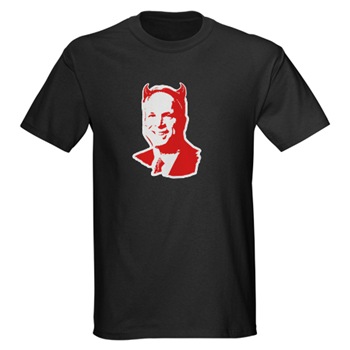 “Perhaps the most puzzling scene in the ad is an altered segment from The 10 Commandments that appears near the end. A Moses-playing Charlton Heston parts the animated waters of the Red Sea, out of which rises the quasi-presidential seal the Obama campaign used for a brief time earlier this summer before being mocked into retiring it. The seal, which features an eagle with wings spread, is not recognizable like the campaign’s red-white-and-blue ‘O; logo. That confused Democratic consultant Eric Sapp until he went to his Bible and remembered that in the apocalyptic Book of Daniel, the Antichrist is described as rising from the sea as a creature with wings like an eagle.“
“Perhaps the most puzzling scene in the ad is an altered segment from The 10 Commandments that appears near the end. A Moses-playing Charlton Heston parts the animated waters of the Red Sea, out of which rises the quasi-presidential seal the Obama campaign used for a brief time earlier this summer before being mocked into retiring it. The seal, which features an eagle with wings spread, is not recognizable like the campaign’s red-white-and-blue ‘O; logo. That confused Democratic consultant Eric Sapp until he went to his Bible and remembered that in the apocalyptic Book of Daniel, the Antichrist is described as rising from the sea as a creature with wings like an eagle.“
You’re one microscopic cog in his catastrophic plan? In TIME, Amy Sullivan parses McCain’s recent “The One” ad to discover that it’s basically a dog whistle for Left Behind evangelicals, declaring Obama is the Antichrist. “A new TIME poll finds that the most conservative evangelicals are the least enthusiastic about McCain’s candidacy. Convincing them that Obama does have two horns and a tail might be the best way of getting them to vote.“
Obama is the Antichrist? Has it really come to this? I know the GOP are feeling on the verge of “Left Behind” this November, but that’s gotta be just about rock-bottom. It’s hard to even imagine an anti-McCain ad that would stoop that low (well, other than that it would probably have to involve the Queen of Diamonds.) And, what with the crazies already percolating, feeding this type of chum to the confused anti-Greg Stillson types out there borders on the criminal.
Come November, these GOP asshats had better lose, and lose big.
And don’t forget the Homosexual Nineties.
“Tyson Homosexual easily won his semifinal for the 100 meters at the U.S. Olympic track and field trials and seemed to save something for the final later Sunday…” The wacko-right American Family Association has a little trouble with their auto-replace software. (It’s been happening for awhile.)
Wright and Wrong.
“I feel that those citizens who say that have never heard my sermons, nor do they know me. They are unfair accusations taken from sound bites…I served six years in the military. Does that make me patriotic? How many years did Cheney serve?” I haven’t watched the Sunday shows yet, but, if today’s press is any indication, the Rev. Jeremiah Wright is the big story in the news, after he delivered remarks in several venues aimed at defending himself against the recent media throng, as well as horrifying attempts by the like of George Stephanopoulos to McCarthify him on national television. (As I said here, we seem to have entirely skipped the rails when kindly ole Mike Huckabee is the biggest voice for tolerance and historical understanding in the conversation.)
At any rate, the return of Obama’s Angry Black Preacher-Man prompted tut-tuts of electoral worry from Clinton-leaning concern trolls like like Salon‘s Joan Walsh, and the usual waiting for the other-shoe-to-drop from breathless political blogs like War Room and Ben Smith. What I haven’t seen yet today, amid all the puttering from the press on the subject of Wright, is any attempt to put the Reverend’s remarks in context of this weekend’s highly dubious acquittal in the Sean Bell case. To wit, New York City cops shoot an unarmed black man and his friends 50 times and end up getting off for it, and, outside of Harlem, there’s barely a shrug, including in the news media. Meanwhile, when it comes to anything and everything involving the fates of Natalee Holloway, Laci Peterson, and any other white damsel in distress, the press drone on about it endlessly, funnelling info to us months or even years after the cases have gone cold. But, as they say, this ain’t Aruba, b**ch.
Is Rev. Wright angry? At this point, and as this weekend’s fiasco makes clear, he has every right to be. Perhaps the press and the punditocracy could investigate more thoroughly why black America may be less inclined to think well of our nation at times, rather than working themselves into yet another holier-than-thou froth about occasional intemperate remarks, and/or endlessly fretting about their potential impact on the electoral whims of the white working class. God forbid these media asshats break out of their echo chamber bubble once in awhile and do some honest-to-goodness reporting. Heck, I’d be happy just to see a few of ’em think for themselves.

